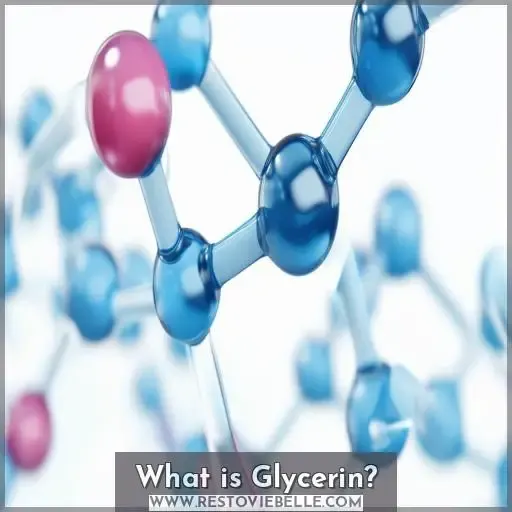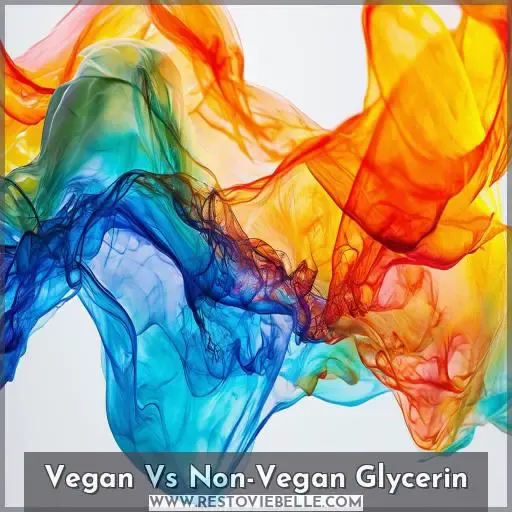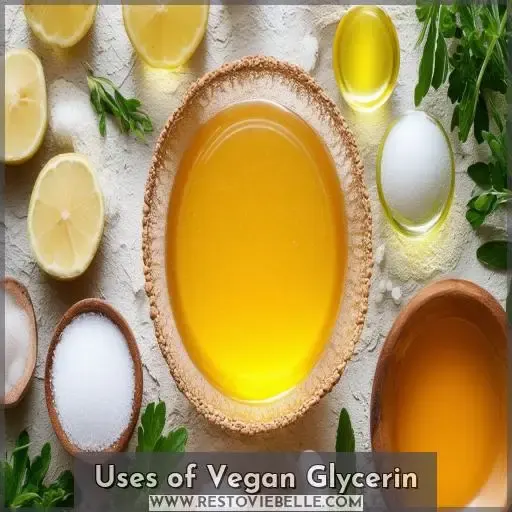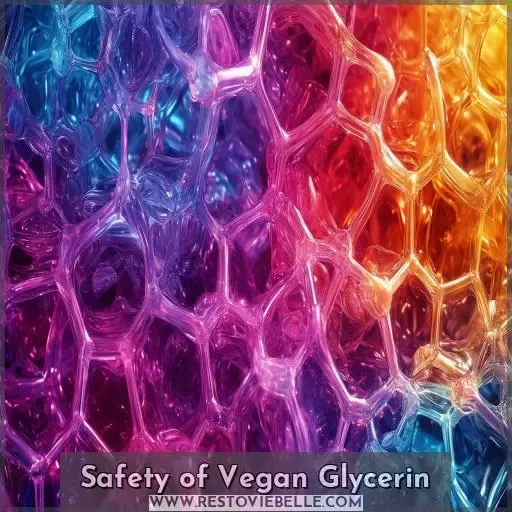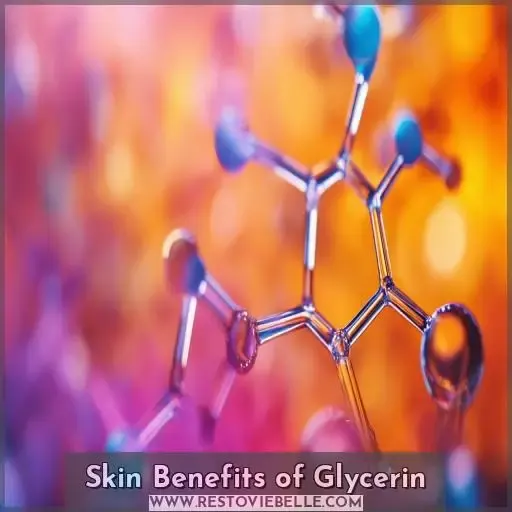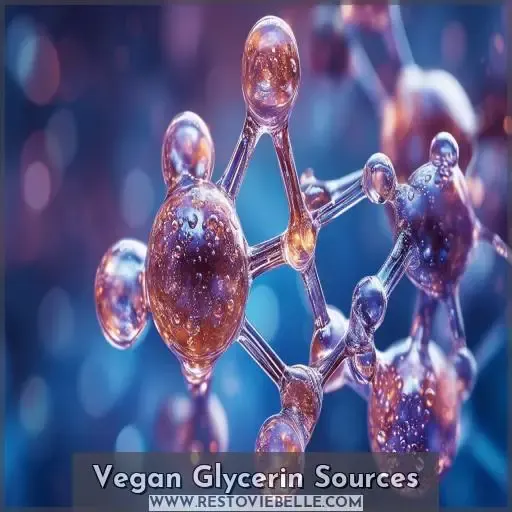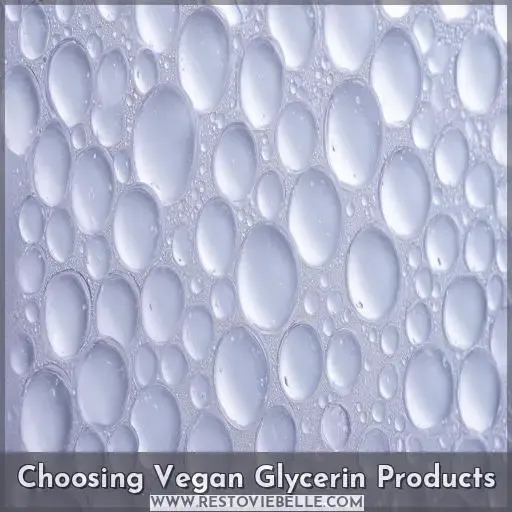This site is supported by our readers. We may earn a commission, at no cost to you, if you purchase through links.
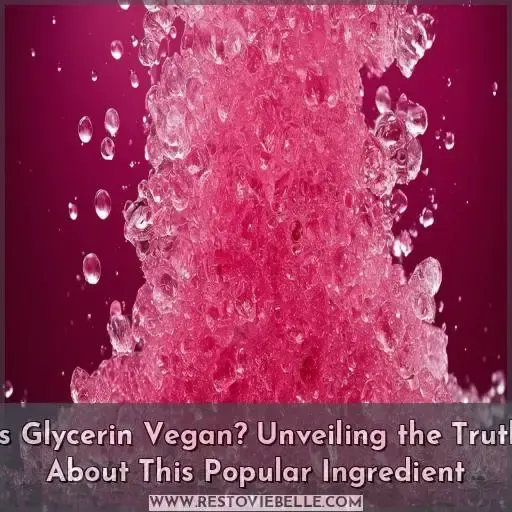 Yes, glycerin is vegan! This versatile ingredient can come from plant-based sources like soybean, corn, and coconut oils – a cruelty-free, eco-friendly alternative to animal-derived glycerin.
Yes, glycerin is vegan! This versatile ingredient can come from plant-based sources like soybean, corn, and coconut oils – a cruelty-free, eco-friendly alternative to animal-derived glycerin.
Vegan glycerin aligns with your ethical values and provides the same moisturizing benefits as non-vegan options. It’s a gentle, FDA-approved humectant that draws moisture into your skin while relieving dryness and irritation.
So you can indulge in glycerin’s skin-soothing properties with a clear conscience.
Want to learn more about harnessing the power of plant-based glycerin? Keep reading to uncover its manufacturing process and superior sources.
Table Of Contents
Key Takeaways
- You can have your glycerin and eat it too! Yep, this sweet little ingredient can be 100% vegan-friendly when it’s sourced from plant-based oils like soybean, corn, or coconut. No harm, no fowl!
- Not only is vegan glycerin cruelty-free, it’s also eco-chic. The manufacturing process is a lean, green, sustainable machine that keeps Mother Nature smiling. Talk about a guilt-free glow-up!
- You know what they say – the proof is in the pudding (or in this case, the pill coating). Vegan glycerin is FDA-approved and gets a big thumbs up for safety in food, pharmaceuticals, and cosmetics. Hello, worry-free indulgence!
- Hello, smooth operator! Glycerin is a moisture magnet that draws hydration into your skin like a sponge. It’s the ultimate thirst-quencher for dry, irritated complexions seeking a vegan remedy for radiant, dewy bliss.
Is Glycerin Vegan?
Yes, glycerin can be vegan. Glycerin derived from plant-based sources like vegetable oils is considered vegan, while glycerin obtained from animal fats is non-vegan.
What is Glycerin?
You’ve likely encountered glycerin in various personal care and food products.
But what exactly is this mysterious ingredient?
Glycerin is a thick, odorless liquid derived from plant or animal fats.
Its chemical composition allows it to absorb and retain moisture, making it an excellent humectant and moisturizer.
Historically used in soaps and candles, modern applications span cosmetics, foods, and pharmaceuticals.
With its versatility and low toxicity, vegetable-based glycerin has become a popular vegan-friendly choice across industries.
Vegan Vs Non-Vegan Glycerin
You’ll find that glycerin can originate from both plant and animal sources. While vegetable glycerin is vegan-friendly, derived from oils like soybean, corn, or coconut through a saponification process, traditional glycerin utilizes animal fats from tallow that undergo heating and straining.
Plant-Based Sources
Plant-based substitutes for glycerin cater to ethical consumption and sustainable sourcing. vegan glycerin sources include:
- Soybean oil
- Corn oil
- Canola oil
- Coconut oil
These plant oils undergo saponification to extract pure, vegan glycerin while minimizing environmental impact. Ensuring your glycerin products originate from such vegan, plant-based sources upholds animal welfare and aligns with eco-friendly values.
Animal-Based Sources
Sadly, non-vegan glycerin is derived from animal fat (tallow). The tallow undergoes a grueling process:
| Step | Process |
|---|---|
| 1 | Mixed with water and heated |
| 2 | Chilled overnight |
| 3 | Boiled to remove excess water |
| 4 | Strained to remove impurities |
This yields a syrupy texture akin to vegan glycerin, but with ethical concerns. Tallow production raises environmental issues too – the bleaching process uses harsh chemicals that can harm ecosystems. For those with skin conditions like eczema or psoriasis seeking a vegan, eco-friendly option, plant-based glycerin is ideal.
Uses of Vegan Glycerin
You’ll find vegan glycerin employed as a preservative and solvent, leveraging its ability to stabilize formulations and dissolve other components. It also finds applications in pharmaceuticals, coating capsules and tablets to aid ingestion and release profiles. Glycerin’s moisture-retaining properties make it a valuable ingredient in skincare products that require humectant action.
Preservative and Solvent
You’ll find glycerin utilized as a preservative and solvent in various applications.
Its ability to dissolve compounds makes it invaluable in pharmaceutical formulations and as a food preservative.
Glycerin’s low toxicity and bleach safety guarantee its solvent applications are environmentally sound.
Its humectant properties help alleviate dry skin through consumption or topical use.
When vegan-sourced, glycerin provides these benefits while aligning with ethical values.
Pharmaceutical Applications
You’ll find vegan glycerin used as a pill coating, gelatin capsule component, and tablet binder in pharmaceuticals. Its moisture-retaining properties make it an ideal ingredient, creating a smooth coating for easy swallowing while ensuring pill integrity. Its versatility makes glycerin a common pharmaceutical excipient you can trust.
Skin Care Benefits
With pharmaceutical uses covered, let’s examine glycerin’s skin care benefits. It’s a significant advantage for sensitive, dry skin types. Why? 1) Humectant properties lock in moisture. 2) Non-comedogenic, so it won’t clog pores. 3) Soothes conditions like eczema and psoriasis. 4) May even reduce wrinkles and brighten complexion. Impressive, right?
Safety of Vegan Glycerin
Vegan glycerin has earned FDA approval as a Generally Recognized As Safe (GRAS) substance, reflecting its low toxicity and suitability for consumption. With an Environmental Working Group (EWG) rating of 1-2, it poses minimal environmental concerns, making it a safe and eco-friendly choice for personal care and industrial applications.
FDA Approval
You’ll be glad to know that vegan glycerin receives the FDA’s seal of approval as ‘Generally Recognized As Safe‘ (GRAS). Complying with stringent guidelines, it poses negligible health risks, making it a consumer-friendly choice. Beyond safety assurances, glycerin provides numerous benefits – from stabilizing pharmaceuticals to moisturizing skincare products and foods.
Environmental Impact
Besides being safe for you, vegan glycerin has little to no environmental impact. Its plant-based manufacturing practices are sustainable and don’t harm animals. You can feel good about using products with vegan glycerin, as they align with ethical and environmental values. Its eco-friendly nature further cements vegan glycerin as a responsible choice.
Consumption Safety
You’ll be relieved to know that vegan glycerin is perfectly safe for consumption. With its FDA approval as a dietary supplement and food additive, you can confidently use it as a cooking or baking ingredient. Its versatility as a flavor enhancer and moisturizing agent makes vegan glycerin a trustworthy choice for health-conscious individuals.
Skin Benefits of Glycerin
Glycerin’s moisturizing properties help improve your skin’s barrier function, which can alleviate symptoms of dry, itchy skin conditions like eczema and psoriasis. Its humectant nature allows it to draw moisture from the air into the skin, providing intense hydration and reducing flakiness or irritation.
Moisturizing Properties
You’ll love how glycerin hydrates your skin! Its incredible absorption and emollience properties make it a skincare superstar. Here’s why it’s a must-have for optimum skin health:
- Draws moisture from the air, preventing dryness
- Seals in hydration for long-lasting softness
- Smooths and plumps skin for a radiant glow
- Gentle enough for even sensitive complexions
With glycerin, dewy, supple skin is just a step away!
Barrier Function Improvement
As a humectant, glycerin helps your skin retain moisture and improves its barrier function. It forms a protective layer that prevents water loss, keeping your skin hydrated and supple. This barrier-restoring ability helps maintain skin health and protection:
| Benefit | Explanation |
|---|---|
| Hydration | Draws moisture into the skin, preventing dryness and dehydration. |
| Barrier Restoration | Forms a protective film that seals in moisture and defends against environmental stressors. |
| Skin Health | Improved hydration and barrier function lead to overall better skin health. |
Eczema and Psoriasis Relief
Glycerin’s hydrating properties make it a potential relief for those with eczema and psoriasis. You’ll find it can:
- Soothe dry, itchy, and inflamed skin
- Lock in moisture to prevent scaling and flaking
- Reduce irritation and discomfort from these conditions
Manufacturing Process
Vegan glycerin is typically manufactured through the saponification method, where plant-based oils and fats are heated with an alkali solution to produce crude glycerin. To guarantee purity and safety for use in consumer products, the crude glycerin then undergoes a carbon bleaching process to remove impurities and improve its quality.
Saponification Method
In the saponification method, you’ll witness a chemical reaction befitting its scientific name. Plant oils undergo a process where fats are heated with an alkaline solution, causing glycerin to separate. This ingenious technique exemplifies industrial innovation by extracting a versatile ingredient with numerous applications. Yet, we must remain mindful of ethical and environmental considerations throughout this intricate process.
Carbon Bleaching
After saponification, you’ll want to submit that vegan glycerin through carbon bleaching.
This chemical process purifies and enhances the glycerin’s purity, ensuring it meets safety regulations.
Carbon bleaching removes impurities, resulting in a colorless, odorless liquid that’s ideal for cosmetics and food.
Eco-conscious brands explore bleaching alternatives with lower environmental impact.
Either way, this key step guarantees your vegan glycerin is top-quality and ready for formulation.
Vegan Glycerin Sources
The most common vegan sources for glycerin are oils derived from plants like soybeans, corn, and canola. These vegetable oils undergo a manufacturing process called saponification to yield glycerin that’s suitable for various applications, from food and pharmaceuticals to skincare products.
Soybean Oil
One of the most prevalent sources is soy. You’ve likely consumed soybean-derived glycerin in these three forms:
- Oil extracted from soybeans
- Byproduct of soy food production
- Concentrated glycerin from soybean processing
Soy offers sustainability through regenerative farming practices. Plus, soybean oil provides heart-healthy fats and antioxidants benefiting your well-being.
Corn Oil
You can also find vegan glycerin derived from corn oil. This sustainable source undergoes rigorous purification and bleaching processes, ensuring purity and stability. Corn oil-based glycerin offers a safe, plant-based alternative free from potential allergens found in other sources. Its consistent quality makes it ideal for sensitive skin care products.
Other Plant Oils
You’ll find glycerin alternatives from several sustainable plant-based oils beyond soy and corn:
- Coconut oil grants a smooth, revitalizing texture
- Palm oil offers a cost-effective, nutrient-rich option
- Sugarcane provides a sweet, eco-friendly glycerin source
With these ethical choices, you can indulge in nature’s gifts while prioritizing environmental consciousness.
Choosing Vegan Glycerin Products
When choosing glycerin products, scrutinize ingredient labels to confirm they list plant-derived sources like soybean, corn, or coconut oil, as these indicate a vegan-friendly option. Additionally, opt for eco-friendly brands that prioritize sustainable manufacturing practices, such as carbon bleaching, to minimize environmental impact while ensuring product purity and safety.
Vegan Sources
You’ll find vegan sources of glycerin from vegetable oils like soybean, corn, canola, palm, and coconut. These plant-based glycerins offer an animal-friendly option. When shopping, look for "vegetable glycerin" on labels to verify you’re getting the vegan version from renewable, cruelty-free sources.
Checking Labels
In choosing vegan glycerin products, you’ll want to check labels diligently. Look for "vegetable glycerin" or specific plant-based sources like soybean, corn, or coconut oil. Avoid products listing "glycerin" alone, which could indicate animal-derived sources. Prioritizing ethical, cruelty-free brands aligns with your values while addressing health concerns and production impact.
Eco-Friendly Options
For eco-conscious consumers, choosing plant-based glycerin aligns with your vegan values and supports sustainability and environmental responsibility. Opt for products made from renewable sources like soybean, coconut, or sugarcane oils – these minimize the carbon footprint while promoting animal welfare. By making informed choices, you’re casting a vote for ethical, environmentally-friendly alternatives.
Frequently Asked Questions (FAQs)
Are there any ethical concerns with vegan glycerin?
You needn’t worry about ethical concerns with vegan glycerin. It’s derived from plant sources like soybeans, corn, or coconut through a safe, eco-friendly process. Vegan glycerin is non-toxic and generally recognized as safe.
How is vegan glycerin different from non-vegan glycerin?
Over 95% of glycerin is plant-based. Vegan glycerin comes from vegetable oils like soy or coconut, while non-vegan uses animal fats and tallow. The processes differ – vegan uses saponification, while non-vegan involves boiling and straining animal fat.
Can vegan glycerin be used in food products?
Yes, vegan glycerin is perfectly safe for use in food products. As an FDA-approved, Generally Recognized As Safe (GRAS) ingredient, you can confidently incorporate it to preserve moisture and enhance texture in foods.
Is vegan glycerin sustainable and environmentally friendly?
Yes, vegan glycerin is highly sustainable. It’s derived from plant sources like soy, corn, and coconut through environmentally-friendly processes. With its low toxicity and biodegradability, vegan glycerin aligns with eco-conscious values.
Are there any potential side effects of using vegan glycerin?
Vegan glycerin has minimal side effects for most users. In rare cases, those with glycerin sensitivities may experience mild skin irritation or digestive discomfort if ingested. Overall, it’s considered safe and suitable for cosmetics and food products.
Conclusion
Scoffing at the notion of cruelty-free glycerin? Your skepticism is unwarranted – glycerin can indeed be vegan. By opting for plant-based sources like soy, corn, or coconut, you gain access to a gentle, FDA-approved moisturizer that aligns with your ethical principles. Embrace the skin-soothing power of vegan glycerin and make an informed choice that resonates with your values.

